2020
70th Berlin International Film Festival
February 20 – March 1, 2020
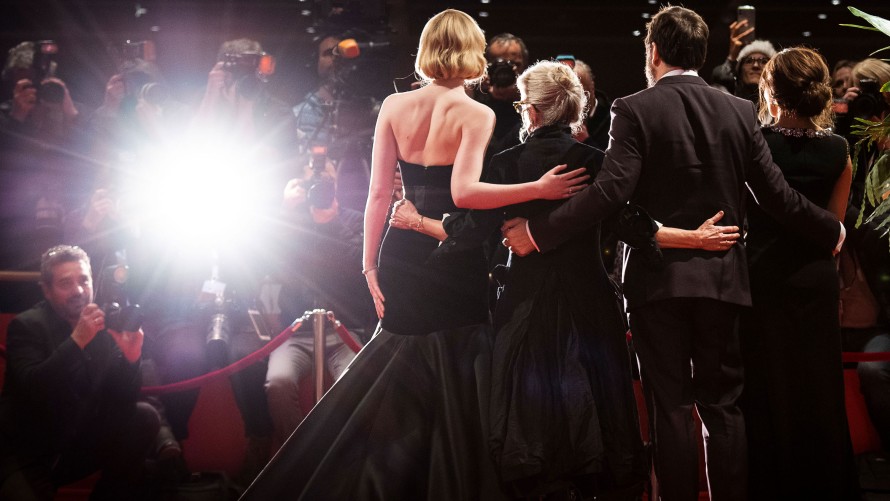
Best of Berlinale 2020
“With its dual leadership and a stronger focus on diversity of content, the Berlinale is better positioned to keep its contemporary edge than the festivals in Cannes and Venice.”
Andreas Busche, “Der Tagesspiegel”, February 20, 2020
2020 was a year of transitions that brought many new things, yet also strongly drew on the traditions of the festival. The new leadership duo, Mariette Rissenbeek and Carlo Chatrian, smoothly implemented the change at the top and introduced innovations in their first year without compromising the festival’s identity. “I think the desire for a revolution or a radical reform was more the wish of the German press. When we were both named as the new festival heads, we quickly and firmly made it clear that the Berlinale is a well-positioned festival and does not require any drastic changes,” explained Carlo Chatrian in an interview with “Deutschlandfunk Kultur” radio (February 15, 2020). And, like their predecessor Dieter Kosslick, they were confronted in their first year with a world outside the festival that would never be the same again. When Kosslick took office in 2001, it was September 11 that was to change politics and society for decades to come; in 2020, it was a virus whose effects were starting to shape global events like no other phenomenon.
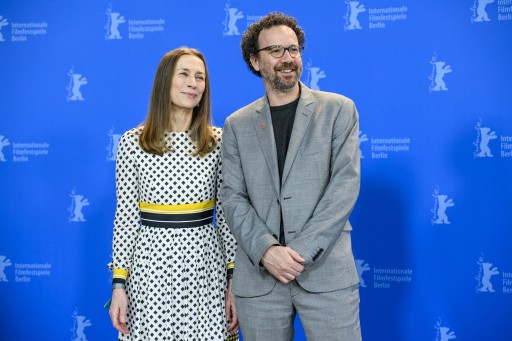
The new directorial duo Carlo Chatrian and Mariette Rissenbeek
Upon their appointment in 2018, Rissenbeek and Chatrian were tasked with a clear mission: the dual leadership was intended to create clear areas of responsibility with business operations primarily being the remit of Managing Director Mariette Rissenbeek and the programme the domain of Artistic Director Carlo Chatrian. The long-running demand for a division of competences had been met.
But first, the new directors had to prove themselves adept at crisis management, a task they met with aplomb. The Cinestar cinema in the Sony Center fell victim to Berlin’s rising rents and was forced to cease operation at the start of the year, causing the festival to lose one of its central venues on Potsdamer Platz. And the logistical problems did not end there: in the Berlinale Palast, the stage show “Magic Mike” was rehearsing for performances in February and had to be convinced to suspend its shows during the festival. The Potsdamer Platz Arkaden, a central point of call for catering for the festival’s guests, was emptying out due to preparations for the complete renovation of the complex in the years ahead. As one shop after another closed, a ghostly atmosphere took hold. In addition, the Haus der Kulturen der Welt, home of the Generation section, was unavailable due to renovations in February 2020. An organisational Herculean task then, which was solved by expanding the use of the CUBIX cinema on Alexanderplatz and reactivating the Urania as a Berlinale venue. The Akademie der Künste on Hanseatenweg also featured once again in the line-up. The festival became more decentralised, the distances between venues greater, even though the best possible solutions were found. In spite of these challenges, the leadership duo never lost their enthusiasm for the festival, as an unperturbed Mariette Rissenbeek professed: “I always imagined the task of managing the Berlinale to be very complex and wide ranging – a great responsibility - and it has ended up being just that. [...] At the same time, it’s incredibly exciting and stimulating to immerse yourself in so many new topics and to get to know the people here who all have a great deal of experience and make you feel very well cared for.” (“Variety”, February 17, 2020)
Berlinale in the Crossfire
The presentation of the selection of films for the 2020 Competition generated a huge amount of curiosity: not a single title was announced in advance, the programme was unveiled in its entirety at the Berlinale press conference. The interest was enormous, the anticipation immense – and yet, that evening, the headlines turned to a completely different topic. In the afternoon, “Die Zeit” newspaper had published an article shining a new light on the role Berlinale founding director Alfred Bauer played during National Socialism. According to the paper, Bauer was not just a follower but actually a high-ranking official in the Reichsfilmintendanz which was systematically covered up by him after 1945. Hardly anyone was talking about the competition programme anymore: the topic of the day was the “zealous SA man” Bauer (Katja Nicodemus, “Die Zeit”, January 29, 2020). After a moment of shock, the festival acted swiftly and decisively: the Leibniz Institute for Contemporary History (IfZ) was tasked with investigating the Bauer case and the 2020 Silver Bear Alfred Bauer Prize was rededicated as the Silver Bear - 70th Berlinale. The Silver Bear Alfred Bauer Prize was suspended for the 2020 festival and will henceforth no longer be awarded.
The festival made public how it is dealing with these findings and the associated responsibility in a press release on September 30, 2020 and published a detailed statement in the summer of 2021, which was updated in the fall of 2022.
Jeremy Irons’ invitation to be President of the International Jury proved to be the next bone of contention. The British actor rightly drew sharp criticism in the past for controversial statements made about same-sex marriage and abortion. Even though he had already apologised previously, the charges reared their head again. Irons reacted by reading a statement at the beginning of the press conference for the International Jury in which he unequivocally supported the right to determination over one’s own body. He concluded: “So I hope that has put my past comments to bed. I thank you for coming this morning, and now, let us get on with ten days of enquiry and celebration.”
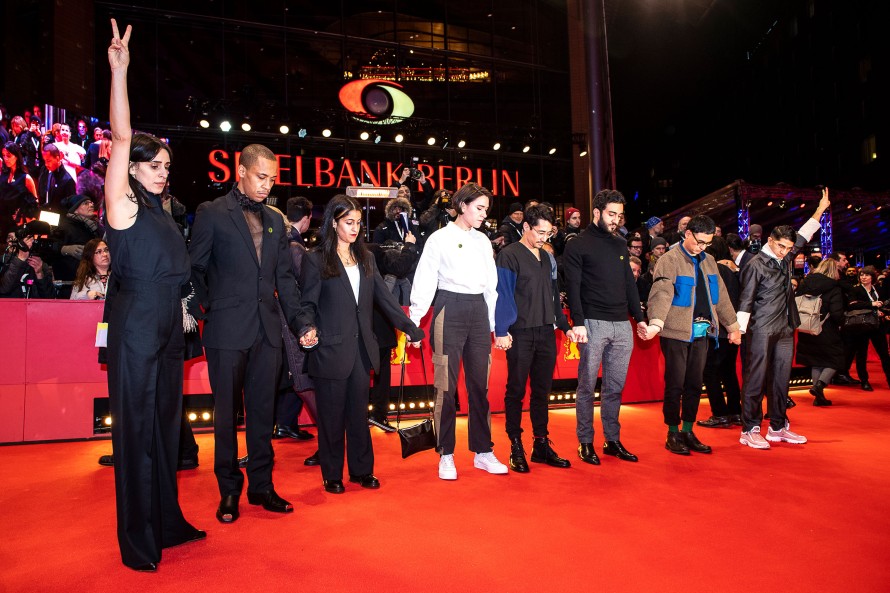
Statement on the Red Carpet in remembrance of the persons killed in Hanau during a racist attack.
Irons’ wish remained unfulfilled: the opening night was overshadowed by an incident that occurred far from the events surrounding the festival in Berlin. At the latter, everything was ready: rather than the usual first film in the Competition, the 70th Berlinale opened with My Salinger Year by Philippe Falardeau, screening as part of Berlinale Special. Margaret Qualley and Sigourney Weaver stepped out onto the packed Red Carpet, the autograph and selfie hunters were in full attendance. But, on the previous day, a German man had killed ten people in Hanau due to racist motives. An incident that fuelled anxious discussions about an increasingly violent right-wing extremist tendency in Germany. And so, the Opening Ceremony of the 70th Berlinale began with a minute’s silence for the victims. And another shadow was already looming: the threat of the coronavirus which, in the following weeks, would bring economic and social life to an almost complete standstill across the globe, was drawing ever nearer. Some market participants from China, where the virus had originated, cancelled their attendance and yet the danger was still too undefined, which fortunately meant that the festival could go ahead to completion as planned.
The First Chatrian Competition
And so the 70th Berlinale took its course in 2020 for the time being and people began to focus on what the festival was actually about: the works in the programme. Carlo Chatrian had set out with a clear curatorial vision: for him, it was solely the artistic quality of the individual films that counted, with an emphasis on their formal characteristics rather than content, their subject matter. Accordingly, identifying a central theme for the programme was of secondary importance, though the Artistic Director did approach an overarching atmosphere: “It is quite difficult to reduce the diversity of a programme like this to a common denominator and to identify a specific theme. But it is a fact that films are seismographs of reality. And our reality is at present not exactly enlightening.” That is why so many of the films have such a [dark and serious] tone. (“MDR KULTUR”, February 19, 2020)
The central focus should not be on the festival organisers and their accomplishments but on the works and their makers. Chatrian emphasised this in modest tones: “I’m not particularly interested in imposing my vision. I’m more interested in expanding my vision and my take on films. In that respect, films are essential and even more so are my conversations with programmers. These exchanges open new perspectives and allow me to better shape the multifaceted festival I have been asked to run.” (“Sight and Sound”, March 2, 2020) The Artistic Director as primus inter pares, a part of the team, governed by curiosity and the intention to learn from every film.

Hong Sangsoo with his protagonists Seo Younghwa (left) and Kim Minhee (right) presenting his film Domangchin yeoja | The Woman Who Ran.
The greatest attention was naturally paid to the first edition of the Competition put together by Chatrian and his new selection committee. Here, too, the festival opted for continuity with many directors from previous years - Christian Petzold, Hong Sangsoo, Sally Potter, Benoît Delépine and Gustave Kervern – being invited again in 2020.
The assessments of the 2020 Competition ranged from pure elation (“After years of backlash, the Berlin International Film Festival has new leadership - and a unique case study in curatorial recovery,” Erik Kohn, “Indiewire”, February 29, 2020) to rather more cautious notes, such as those detected by Christiane Peitz in view of the response by the international press (“Der Tagesspiegel”, March 3, 2020). And structural problems remained under the new leadership, such as the date of the Oscars which, having been brought forward in 2020, forced the management to move the festival so it ended in March. In addition, there was widespread concern among journalists regarding global cinema production as a whole: “In the age of streaming and a decaying cinema industry, the diet of films from which festivals such as the Berlinale feed will shrink rather than grow [...]: the volume of interesting films of a quality they have been used to for decades simply seems no longer to exist.” (Andreas Borcholte and Hannah Pilarczyk, “Der Spiegel”, March 1, 2020)
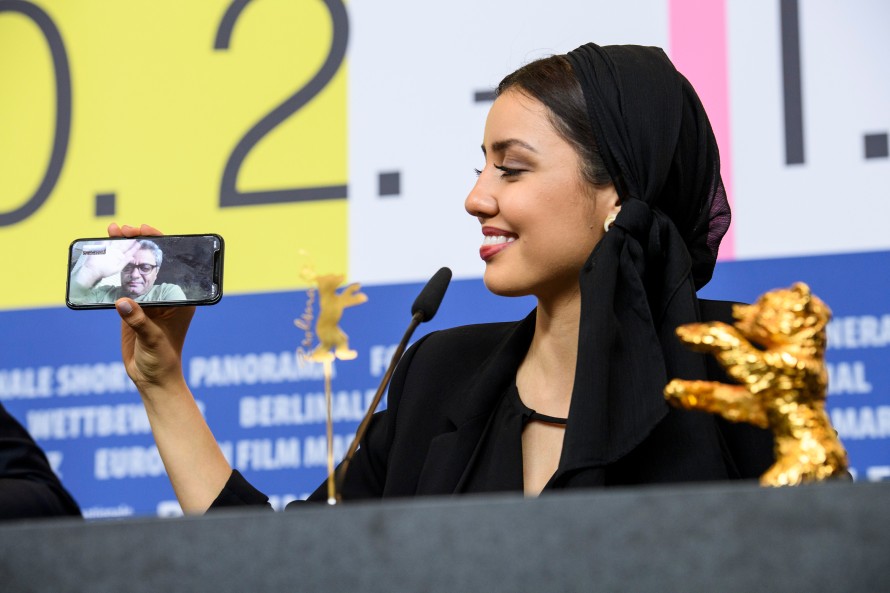
Baran Rasoulof, the Iranian director's daughter, called her father, who was banned from leaving the country, via video chat during the press conference for the Golden Bear award.
A Well-Deserved Winner
On the evening of the Award Ceremony, everyone was united regarding the decision about the Golden Bear. The Iranian entry Sheytan vojud nadarad by Mohammad Rasoulof had received a standing ovation at its premiere the previous evening and, on the following day, it was already clear which film would win the 70th Berlinale’s main prize. Following Nader and Simin, A Separation (2011) and Taxi (2015), Rasoulof’s Sheytan vojud nadarad marked the third time in a decade that the festival honoured a film from Iran with the Golden Bear. The presentation of the award was also reminiscent of the evening when Taxi won: like Panahi, Rasoulof had been banned from leaving his country by the Iranian regime and so his daughter Baran Rasoulof, who also stars in the film, accepted the award on his behalf along with the producers. Though the director himself did actually make an appearance later in the evening when, during the award winners’ press conference, his daughter quickly called him by video chat. The Berlinale protested with great concern when, a week after the festival, an arrest order was issued against Rasoulof. The director had been sentenced some time previously but, until then, had been spared from prison.
Audiences and critics alike were also convinced by the decisions for the other awards. Eliza Hittman’s highly acclaimed Never Rarely Sometimes Always won the Special Jury Prize while Hong Sangsoo was honoured as Best Director. The award for Best Actress went to Paula Beer for her role in Christian Petzold’s Undine; Elio Germano won Best Actor for his performance as the artist Antonio Ligabue in Volevo nascondermi by Giorgio Diritti. A second Silver Bear went to Italy for a film in which Elio Germano also played the lead, with the D’Innocenzo brothers winning the Best Screenplay award for Favolacce.
The only contentious decision was the award for Outstanding Artistic Contribution, yet this was not about the quality of the work by German cinematographer Jürgen Jürges but due to the on-set conditions of the film for which he won the prize. “In 2011, a reporter for GQ magazine travels to the Ukrainian city of Kharkiv. There, he visits a film set, or something that a film set had become: a parallel world in which people have been living and working for years.” (Viktoria Morasch, “taz”, February 22, 2020) The mammoth three-year project DAU was in part financed with money from the Medienboard Berlin-Brandenburg but also with the support of a Russian oligarch.
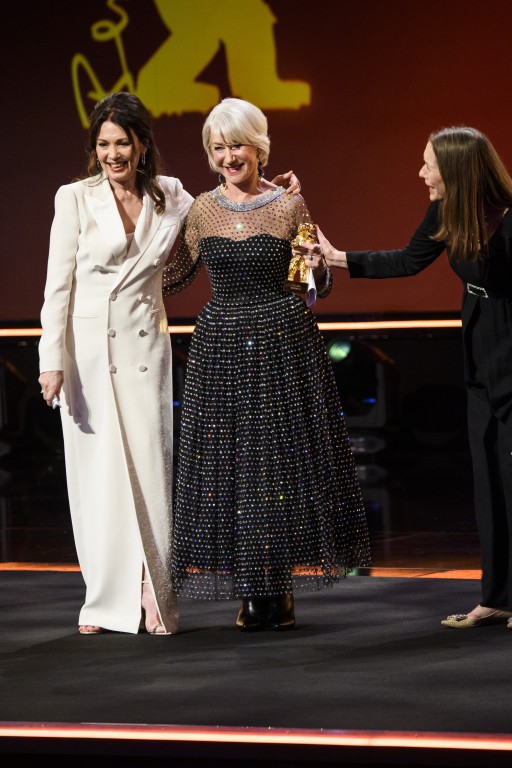
Helen Mirren, recipient of the Honrary Golden Bear 2020 with laudator Iris Berben (left) and Executive Director of the Berlinale, Mariette Risenbeek (right).
The presentation of the Honorary Golden Bear to the British actress and Oscar winner Dame Helen Mirren was, on the other hand, not at all controversial. In their laudatory speech for Mirren, Chatrian and Rissenbeek recognised her not only as one of the greatest actresses of her generation but also as a pioneer for change in the film world: “She knows how to transform decorative female roles into complex female characters. She combines extraordinary acting skills with British understatement. She breaks through barriers in both her work and her personal life. She was already discussing the abuse of power in the film world 25 years before #MeToo.” It was thus fitting that Mirren’s acceptance speech in front of the Berlinale Palast audience proved to be largely political: “When I began work in film, out of maybe a hundred people on set, there were – if I was lucky – three women, at the most. That is changing. But not yet enough. When I began work in film, all faces on set were white. And that is changing. But not yet enough. When I began work in film, racist or sexist language and behaviour was normal, it was an accepted reality of life. That is changing. But not yet enough. The only reason I want to continue in this brilliant industry is to witness more of that change that I find so liberating and so exciting.”
Overall, the critics recognised in many things in 2020 the hand of Chatrian. Marius Nobach, for example, saw “a Competition with films that required a great willingness to engage with idiosyncratic narrative forms as well as concentration and patience. Also, the striking amount of tough material, presented without compromise [...]. In their first year, the Competition in any case offered a concentrated cluster of memorable films that do not make it easy for themselves and often not for the audience, either” (“Filmdienst”, March 1, 2020).
This is also true of the winner of the Berlinale Documentary Award which, for the first time at the 70th Berlinale, was presented in cooperation with public broadcaster rbb and which went to Irradiés by Rithy Panh, screening in the Competition. A cinematic tour de force that transforms the cinema screen into a triptych and makes the distortions and genocides of the 20th century tangible with all the power and force that images can muster.
The bestowal of the prizes clearly demonstrated that political thinking remained a characteristic of the Berlinale even under new leadership. What had changed was the tonality of this thinking and a more nuanced approach. This became apparent in a series of texts Chatrian wrote about Berlinale films of previous years entitled “…recounting the years” in which he engaged with the tradition of the festival. Rather than working out a general politics of cinema, the texts analysed the individual politics of the films, showing how, in their unique ways, images change the relationship of the viewer to the visible, and thus to the social world. Such a form of politics is not a given, it is in a state of flux: “I think the ways in which films are political today is very different from those of the 1970s and 1980s. The role of politics has changed, as have the boundaries between the private and the political. For me, the most political films [...] are those that want to change the viewer’s opinions. And the more subtle their effect, the better,” explained Chatrian (“Berliner Zeitung”, February 16, 2020).
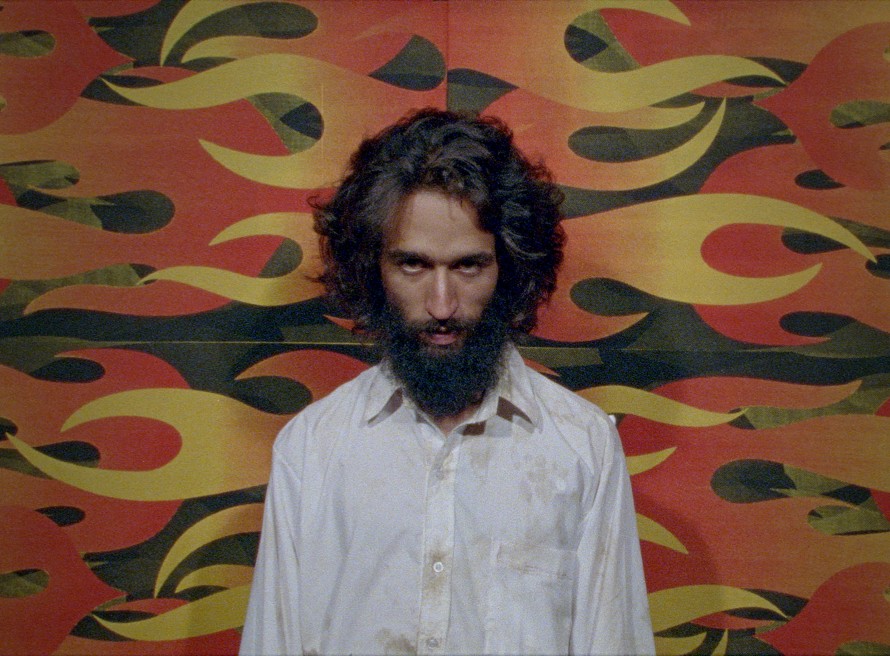
Los Conductos by Camilo Restrepo which ran in the Encounters section won the GWFF Best First Feature Award.
Encounters
The new section initiated by Rissenbeek and Chatrian, Encounters, was consistently well received, even if some commentators were concerned that the new series was not easy enough to distinguish from the Forum. Mainstays of the Forum, such as Heinz Emigholz, now had their new works presented in Encounters. But apart from the critical voices, there were also many who were looking forward to the new border demarcations and transgressions: “Perhaps the interplay between Encounters [...] and the Forum actually presents a productive challenge from which the entire festival can profit. The first few days certainly point in this direction.” (Bert Rebhandl, “FAZ”, February 16, 2020) Positive and even euphoric responses dominated: the section was called a “wild journey of discovery” (Andreas Borcholte and Hannah Pilarczyk, “Der Spiegel”, March 1, 2020) and “a big plus” (Tim Caspar Boehme, “taz”, March 2, 2020). Films like Victor Kossakovsky’s Gunda and Sandra Wollner’s The Trouble With Being Born were celebrated enthusiastically. Chatrian could also feel vindicated in his selection by the fact that, in addition to the section’s own prizes, the GWFF Best First Feature Award also went to an Encounters film: Los conductos by Camilo Restrepo. Across the board, the films were easily able to meet the section’s goal of screening idiosyncratic, aesthetically courageous works that could be regarded as the avant-garde of cinema.
The 70th Anniversary
A special series on the occasion of the festival’s 70th edition was also curated by Chatrian: he invited seven filmmakers who had already screened a film at the Berlinale to each in turn invite another guest to participate in a conversation at the Akademie der Künste. A film by one of the filmmakers was screened before the talk, one by the other afterwards. “On Transmission” featured Ang Lee, Olivier Assayas, Claire Denis and many other greats. In addition, the anniversary edition was heralded by a special countdown in the run-up to the festival. In cooperation with various partner institutions, an exhibition, a concert and other events could be enjoyed across Berlin. The new festival management deliberately set out to establish a close collaboration with the city.
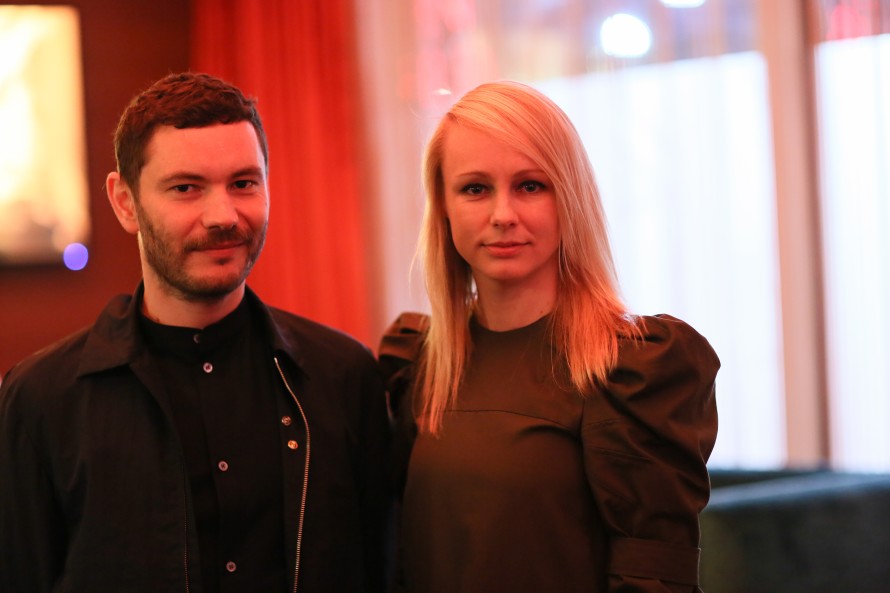
Michael Stütz, section head of Panorama with Australian director Kitty Green.
Personnel Changes in the Sections
It was not only the festival leadership that was new: there was also a lot of movement within the sections. And here, too, continuity was favoured over a harsh break. In Panorama, Michael Stütz took over sole leadership as his colleague, Páz Lazaro, joined Chatrian’s selection committee. The section’s programme was no less powerful and combative than in previous years: “In times like these, we cannot rest on our laurels,” said Stütz (“Der Tagesspiegel”, February 20, 2020). A main focus traditionally – and now more than ever – lay on LGBTQI* cinema whose fascinating diversity Stütz was adept at showcasing. The reduction in the number of films requested of Panorama by the new management was well received: “Panorama especially benefited from streamlining, presenting a revitalised selection.” (Jessica Kiang, “Sight and Sound”, March 4, 2020)
The Perspektive Deutsches Kino also underwent a reduction in 2020 – from twelve films to eight. Here too, the stronger focus was positively received: “A quality offensive from which the series is clearly benefitting.” (Gunda Bartels, “Der Tagesspiegel”, February 20, 2020) And, with its move to the Kino International, the section could now celebrate its premieres in worthy surroundings.
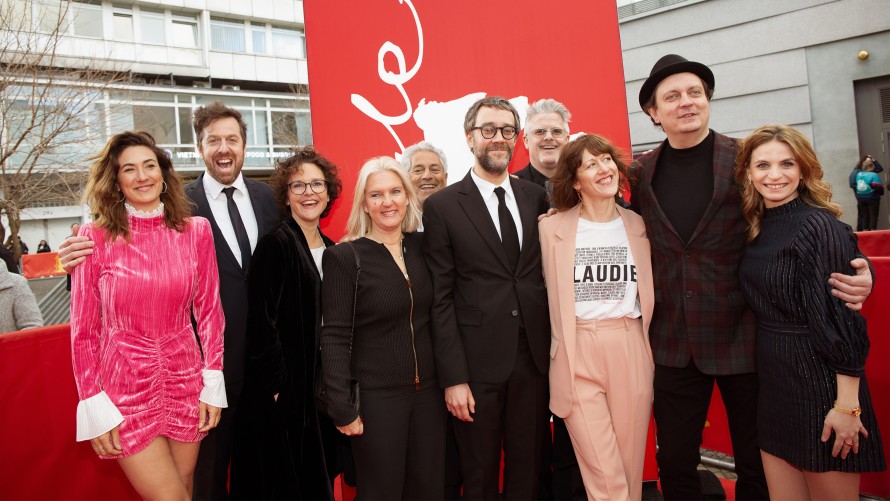
Julia Fidel (3rd from right), the new head of Berlinale Series with the team and cast of C’est comme ça que je t’aime.
Julia Fidel, long-serving associate of Generation and Panorama, became head of Berlinale Series. On the occasion of her inaugural festival, she particularly thanked her predecessor Solmaz Azizi who founded the section in 2015 and then systematically expanded it. Fidel was ambitious in her first year’s programme: “I wanted to make sure we are showing a very versatile picture of what is happening in the TV world [...]. I didn’t want to stick to the genres we’re used to seeing. We tried to get the message out that we wanted to go beyond crime series and costume dramas.” (“Screendaily”, February 18, 2020) With Sex, a series was screened for the first time whose episodes did not conform to the now conventional 50-60 minutes length but instead ran at just under 15 minutes each. Fidel programmed the series by Amalie Næsby Fick in its entirety, screening every episode. The new head was able to draw on vast resources because the past few years have seen an ever greater diversification and growing courage to fill specific niches in the international series landscape, as she emphasised in an interview with “Blickpunkt Film” (February 21, 2020).
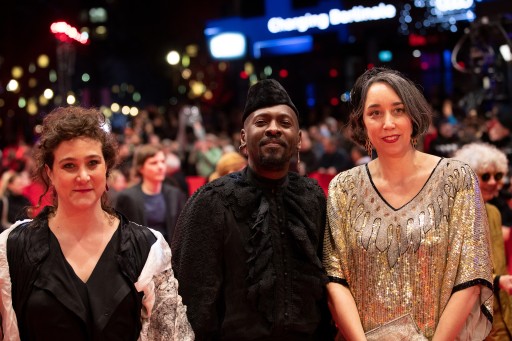
Anna Henckel-Donnersmarck (right) with Fatma Çolakoğlu and Lemohang Jeremiah Mosese, who were part of the Berlinale Shorts jury 2020
Continuity was also present in Berlinale Shorts. New section head Anna Henckel-Donnersmarck, a member of the selection committee for many years, was full of praise for her predecessor Maike Mia Höhne who had moved to the Kurzfilm Festival Hamburg at the end of the 2019 Berlinale. “We get the big cinemas, we are part of the award ceremony and our filmmakers walk across the Red Carpet on Saturday. So shorts already have a great position in the festival, and this is very much thanks to Maike. It made it very easy for me to build upon” (“Cineuropa”, February 25, 2020).
There were more changes yet. After Milena Gregor, Birgit Kohler and Stefanie Schulte Strathaus had taken over the leadership of the Forum on an interim basis for the 69th Berlinale following Christoph Terhechte’s surprise departure from the section, in May 2019 their successor was announced: the journalist, writer and programmer Cristina Nord. As an editor for the “taz” newspaper, she had been following and supporting the festival for years and, in an interview, she revealed that she already felt very much at home (“Berliner Morgenpost”, February 20, 2020). For her first programme, she identified a plethora of films dealing with the question of how the past can be actualised. This presented a perfect connection to the anniversary of the Forum which celebrated its 50th year in 2020 and brought the works of its first edition back to the big screen. It was surprising to see that the topics had hardly changed and, although progress has been made, the problems and inequalities have still not been solved on a structural level. Racism and feminism were and are still the central topics of countless discussions and many films in both 1971 and 2020 – precisely because, just like in Hanau, a backward-looking tendency based on differences rather than equality could be observed in societies across the world. “There is a backlash, and it is palpable in many places around the globe. So with the anniversary programme comes a hypothesis: watching these films, we might be able to rediscover strategies that worked back then and adjust them accordingly to help us face new challenges,” as Nord put it (“Sight and Sound”, March 2, 2020).
The only Berlinale Camera of 2020 was presented to an “institution” of the Forum: Ulrike Ottinger who, since 1984, has presented many of her films in the section as well as in the Competition and in Panorama. When asked about the new festival leadership, she probably spoke for the overwhelming majority of festival-goers when she said: “Both are great film connoisseurs and passionate cineastes [...]. What I like about the new directors is that both consciously see themselves as hosts and shun publicity. This deliberately understated style suits the Berlinale well because in this way the films clearly become the centre of attention again and nothing else.” (“Filmdienst”, February 24, 2020)
So, in spite of a whole range of adversities, the 2020 Berlinale presented an extremely positive start for the new leadership duo, a fact to which the sale of over 330,000 tickets, more than 18,000 accredited industry guests and 3,500 representatives of the press also attested. A great interest, enthusiasm and anticipation was palpable for the next edition. “The 70th Berlinale – under new leadership - pulled together enough finds and fresh ideas to seem open to the future [...]. The festival changed in shape this year – not a wholesale revolution but an evolution, in very welcome directions.” (Jessica Kiang, “Sight and Sound”, March 4, 2020)
Facts & Figures of the 2020 Berlinale
| Visitors | |
|---|---|
| Total amount of theater visits | 479,365 |
| Tickets sold | 330,681 |
| Professionals | |
| Accredited guests (press excl.) | 18,518 |
| Countries of origin | 132 |
| Press | |
| Journalists | 3,447 |
| Countries of origin | 82 |
| Screenings | |
| Number of films in the public programme | 341 |
| Total amount of screenings | 1,103 |
| European Film Market | |
| Film industry participants | 11,423 |
| Number of films | 732 |
| Number of screenings | 971 |
| EFM-Stands (Gropius Bau & Marriott Hotel) | 203 |
| Number of exhibitors | 564 |
| Berlinale Co-Production Market | |
| Participants | 568 |
| Countries of origin | 63 |
| Berlinale Talents | |
| Participants | 253 |
| Countries of origin | 84 |
| Annual budget | € 27.2 million |
| The Berlin International Film Festival receives € 10.4 million in institutional funding from the Federal Government Commissioner for Culture and the Media. |
Further statistics
In addition to the film statistics, the Berlinale has published the ratio of female directors in the Berlinale programme every year since 2004: Download, PDF (1.4 MB)
The gender evaluation has developed increasingly in the last years: Download, PDF (2.0 MB)